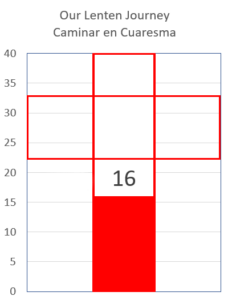

Our Lenten Journey / Caminar en Cuaresma
versión en español
Saturday – March 11 – Day 16
Consolation for the Repentant Sinner
“ Look, all these years I served you and not once did I disobey your orders; yet you never gave me even a young goat to feast on with my friends. But when your son returns who swallowed up your property with prostitutes, for him you slaughter the fattened calf.” Luke 15:29-30
This was the reaction of the faithful son in the Parable of the Prodigal Son. Recall that after squandering his inheritance, the Prodigal Son returns home humiliated and poor, asking his father if he will take him back and treat him as if he were a hired hand. But the father surprises him and throws a huge party for the son to celebrate his return. But the father’s other son, the one who remained with him throughout the years, would not join in the celebration.
Was it fair that the father killed the fatted calf and threw this large party to celebrate his wayward son’s return? Was it fair that that same father apparently never even gave his faithful son a young goat to feast on with his friends? The right answer is that this is the wrong question.
It’s easy for us to live in such a way that we always want things to be “fair.” And when we perceive that another receives more than us, we can get angry and bitter. But asking whether or not this is fair is not the right question. When it comes to the mercy of God, God’s generosity and goodness far exceed what is perceived as fair. And if we are to share in the abundant mercy of God, we too must learn to rejoice in His overflowing mercy.
In this story, the act of mercy given to his wayward son was exactly what that son needed. He needed to know that no matter what he had done in the past, his father loved him and rejoiced in his return. Therefore, this son needed an abundance of mercy, partly to reassure him of his father’s love. He needed this extra consolation so as to become convinced that he made the right choice in returning.
The other son, the one who had remained faithful throughout the years, was not treated unfairly. Rather, his discontent came from the fact that he himself lacked the same abundant mercy present in the heart of his father. He failed to love his brother to the same extent and, therefore, failed to see the need to offer this consolation to his brother as a way of helping him understand he was forgiven and welcomed back. Mercy is very demanding and far exceeds what we may at first perceive as rational and just. But if we desire to receive mercy in abundance, we must be ready and willing to offer it to those who need it the most.
Reflect, today, upon how merciful and generous you are willing to be, especially toward those who do not appear to deserve it. Remind yourself that the life of grace is not about being fair; it’s about being generous to a shocking extent. Commit yourself to this depth of generosity toward all and look for ways that you can console another’s heart with the mercy of God. If you do, that generous love will also bless your heart in abundance.
Do I have within me overflowing mercy for those who have sinned against me?
Let us pray:
My most generous Lord, You are compassionate beyond what I can fathom. Your mercy and goodness far exceed what any of us deserve. Help me to be eternally grateful for Your goodness and help me to offer that same depth of mercy to those in most need.
Source: mycatholic.life
USCCB Daily Readings: bible.usccb.org/bible/readings/031123.cfm
Sábado – 11 de marzo – Día 16
Consuelo para el pecador arrepentido
“Mira, todos estos años te serví y ni una sola vez desobedecí tus órdenes; sin embargo, nunca me diste ni siquiera un cabrito para deleitarme con mis amigos. Pero cuando regrese tu hijo, que se tragó tus bienes con prostitutas, sacrificarás para él el becerro engordado”. Lucas 15:29–30
Esta fue la reacción del hijo fiel en la Parábola del Hijo Pródigo. Recuérdese que después de dilapidar su herencia, el Hijo Pródigo vuelve a casa humillado y pobre, pidiéndole a su padre que lo acepte y lo trate como si fuera un jornalero. Pero el padre lo sorprende y organiza una gran fiesta para que el hijo celebre su regreso. Pero el otro hijo del padre, el que permaneció con él a lo largo de los años, no quiso unirse a la celebración.
¿Fue justo que el padre matara al ternero engordado y organizara esta gran fiesta para celebrar el regreso de su hijo descarriado? ¿Era justo que ese mismo padre aparentemente nunca le diera a su fiel hijo un cabrito para darse un festín con sus amigos? La respuesta correcta es que esta es la pregunta equivocada.
Es fácil para nosotros vivir de tal manera que siempre queremos que las cosas sean “justas”. Y cuando percibimos que otro recibe más que nosotros, podemos enfadarnos y amargarnos. Pero preguntar si esto es justo o no no es la pregunta correcta. Cuando se trata de la misericordia de Dios, la generosidad y la bondad de Dios superan con creces lo que se percibe como justo. Y si vamos a compartir la abundante misericordia de Dios, también debemos aprender a regocijarnos en Su sobreabundante misericordia.
En esta historia, el acto de misericordia dado a su hijo descarriado fue exactamente lo que ese hijo necesitaba. Necesitaba saber que sin importar lo que hubiera hecho en el pasado, su padre lo amaba y se regocijaba por su regreso. Por lo tanto, este hijo necesitaba mucha misericordia, en parte para asegurarle el amor de su padre. Necesitaba este consuelo extra para convencerse de que había hecho bien en volver.
El otro hijo, el que se había mantenido fiel a lo largo de los años, no fue tratado injustamente. Más bien, su descontento provenía del hecho de que él mismo carecía de la misma misericordia abundante presente en el corazón de su padre. No supo amar a su hermano en la misma medida y, por lo tanto, no vio la necesidad de ofrecer este consuelo a su hermano como una forma de ayudarlo a comprender que estaba perdonado y acogido. La misericordia es muy exigente y supera con creces lo que en un principio podemos percibir como racional y justo. Pero si deseamos recibir misericordia en abundancia, debemos estar listos y dispuestos a ofrecerla a quienes más la necesitan.
Reflexiona hoy sobre cuán misericordioso y generoso estás dispuesto a ser, especialmente con aquellos que no parecen merecerlo. Recuerda que la vida de gracia no se trata de ser justo; se trata de ser generoso hasta un punto impactante. Comprométete con esta profundidad de generosidad hacia todos y busca formas en las que puedas consolar el corazón de otro con la misericordia de Dios. Si lo hace, ese amor generoso también bendecirá su corazón en abundancia.
¿Tengo dentro de mí una misericordia sobreabundante para los que han pecado contra mí?
Oremos:
Mi más generoso Señor, eres compasivo más allá de lo que puedo comprender. Tu misericordia y bondad superan con creces lo que cualquiera de nosotros merece. Ayúdame a estar eternamente agradecido por Tu bondad y ayúdame a ofrecer esa misma profundidad de misericordia a los más necesitados.
Lecturas de Hoy: bible.usccb.org/es/bible/lecturas/031123.cfm